
Protein plays a vital role in our overall health, from building muscle to supporting immune function. Yet many people remain confused about how much they need, where to find it, and how to incorporate it properly into their diet. Whether you’re an athlete looking to optimize performance, someone taking GLP-1 medications, or simply wanting to maintain good health, understanding protein is essential for making informed dietary choices.
Jennifer Silva, a registered dietician and certified diabetes educator at Tryon Medical Partners, shares her expert insights on protein intake and offers practical advice for incorporating adequate protein into your diet through simple, effective nutritional strategies.
1. What is protein and why does it matter?
Recognizing the fundamental role protein plays in your body helps you make better dietary choices.
“Protein makes up our muscles and we need that throughout our entire body,” explains Silva, who has lived with Type 1 diabetes for almost 25 years. “Protein with carbohydrates is the optimal fuel for exercising, recovering, and supporting many of our bodily functions. As someone who manages a chronic medical condition, I know how important diet is to keep the body healthy.”
Protein is made up of amino acids and serves as an essential building block for tissue throughout the body. While many people associate protein primarily with muscle development, it’s equally important for immune function, skin health, and many other physiological processes.
2. Where can I get my protein?
Protein can be found in a wide variety of foods beyond the obvious meat options.
“There are many plant sources of protein. People don’t tend to think plant-based protein sources have enough protein, but it depends on individual needs,” notes Silva. “Tofu is probably the most commonly known plant-based source, which comes from the soybean. Edamame, tempeh, and tofu are excellent soybean-based options.”
Other valuable protein sources include beans, legumes, certain breads, chia seeds, hemp seeds, and nuts. “Among nuts, peanuts and almonds have the highest protein content, and pistachios are a close third. Pistachios, in fact, are especially important for female health because they are a rich calcium source essential to increasing bone density, helping to prevent bone diseases such as osteoporosis,” Silva advises. “Eggs, low-fat dairy products, and traditional animal proteins like poultry, fish, and lean meats round out the array of protein options in a typical diet.
3. How much protein should I be eating?
Understanding how much protein you personally need is key to balanced nutrition.
“On average, in general, we recommend having a protein portion that equals the palm of your hand, no fingers,” advises Silva. “For an average-sized female, that’s 3 ounces. For an average-sized male, that’s 4 ounces per meal.”
These recommendations can vary based on individual circumstances such as height, activity level, and medical conditions. Silva, who is very athletic, notes that she requires larger protein portions than the average person to support muscle growth and recovery.
4. How do I know if I’m getting too much or too little protein?
Both insufficient and excessive protein consumption can impact your health in various ways.
Though relatively rare in adults, signs of insufficient protein may include:
- Generalized weakness
- Hair loss
- Lethargy
- Weakened nails
- Stunted growth
- Weight loss
- Anemia
- Weakened immune system
Although protein is a hot nutritional topic right now, it is possible to have too much of a good thing. “For diabetes patients like me, too much protein can negatively affect blood glucose levels. Others might experience stalled weight loss, higher cholesterol levels, or poor muscle recovery,” Silva points out. “Long-term excess protein intake can result in other micronutrient deficiencies and is something to be taken seriously.”
5. Who should consider eating more protein?
Certain groups benefit from increased protein intake due to their specific physiological needs.
“Definitely the elderly need a bit more protein, as well as kids, though it can be difficult if they have food aversions,” notes Silva. “The vegan population often needs to be more intentional about protein intake, as well as vegetarians given how many protein sources are animal products.”
Silva also highlights that “those on dialysis need twice as much protein than a person off dialysis would need.” People taking GLP-1 medications for weight loss or diabetes management may also benefit from focusing on adequate protein intake.
6. What should I eat with protein?
Protein should be part of a balanced nutritional approach rather than the sole focus.
“People sometimes overemphasize the importance of protein and don’t recognize the balance with carbohydrates,” Silva explains. “When exercising, people focus on just the protein, not the protein and the carbs. They will often do better with muscle recovery when they’re incorporating both.”
This imbalanced approach can lead to elevated cholesterol, poor muscle recovery, or high blood glucose levels. “Often, protein is so highly prioritized that people neglect other food groups. It’s important to maintain a balance of all of it,” she emphasizes.
Looking for easy ways to incorporate protein? Silva recommends the following dishes for a protein-packed punch:
- Low-fat cottage cheese with berries and chia seeds
- Homemade egg bites with cottage cheese
- Nuts, including pistachios or almonds
- Low-fat cheese paired with fruit
“Understanding your personal protein needs and implementing balanced nutrition can significantly improve your overall health and well-being,” she notes. “Your body will thank you for the effort.”
If you’re concerned about your protein intake or want to learn more about personalized nutrition strategies, schedule an appointment with a registered dietician.

